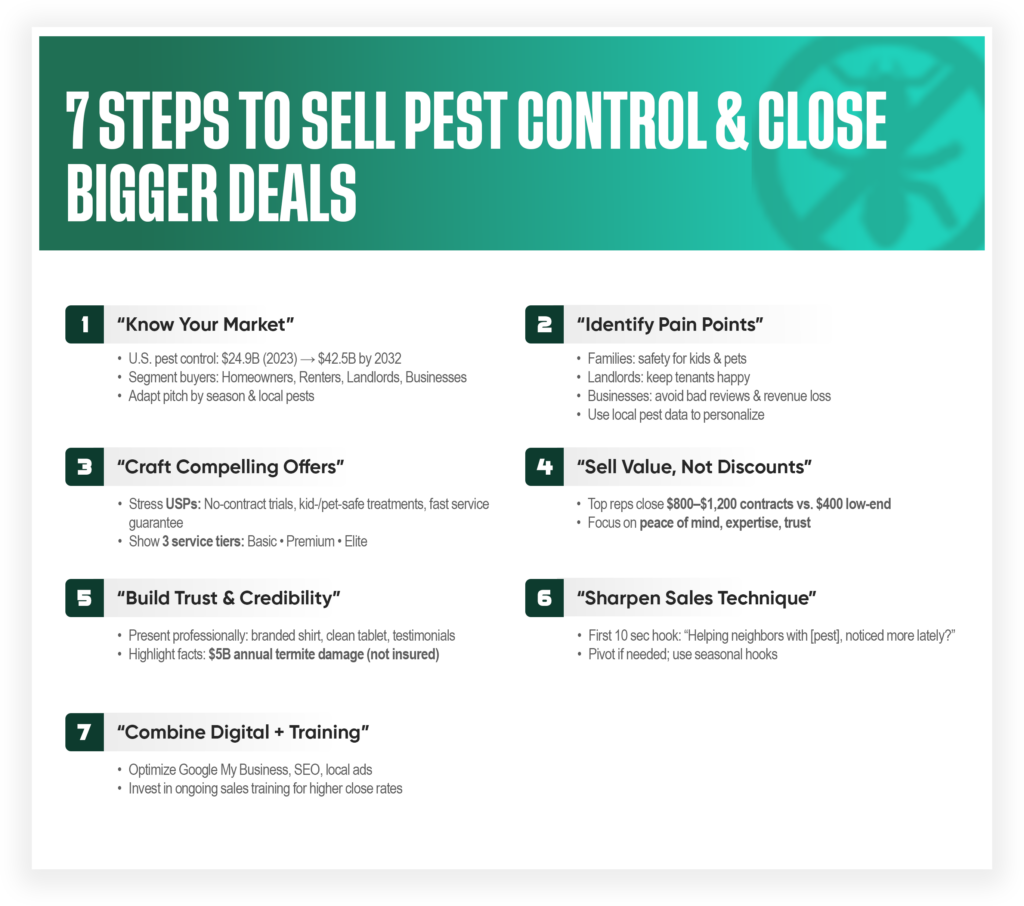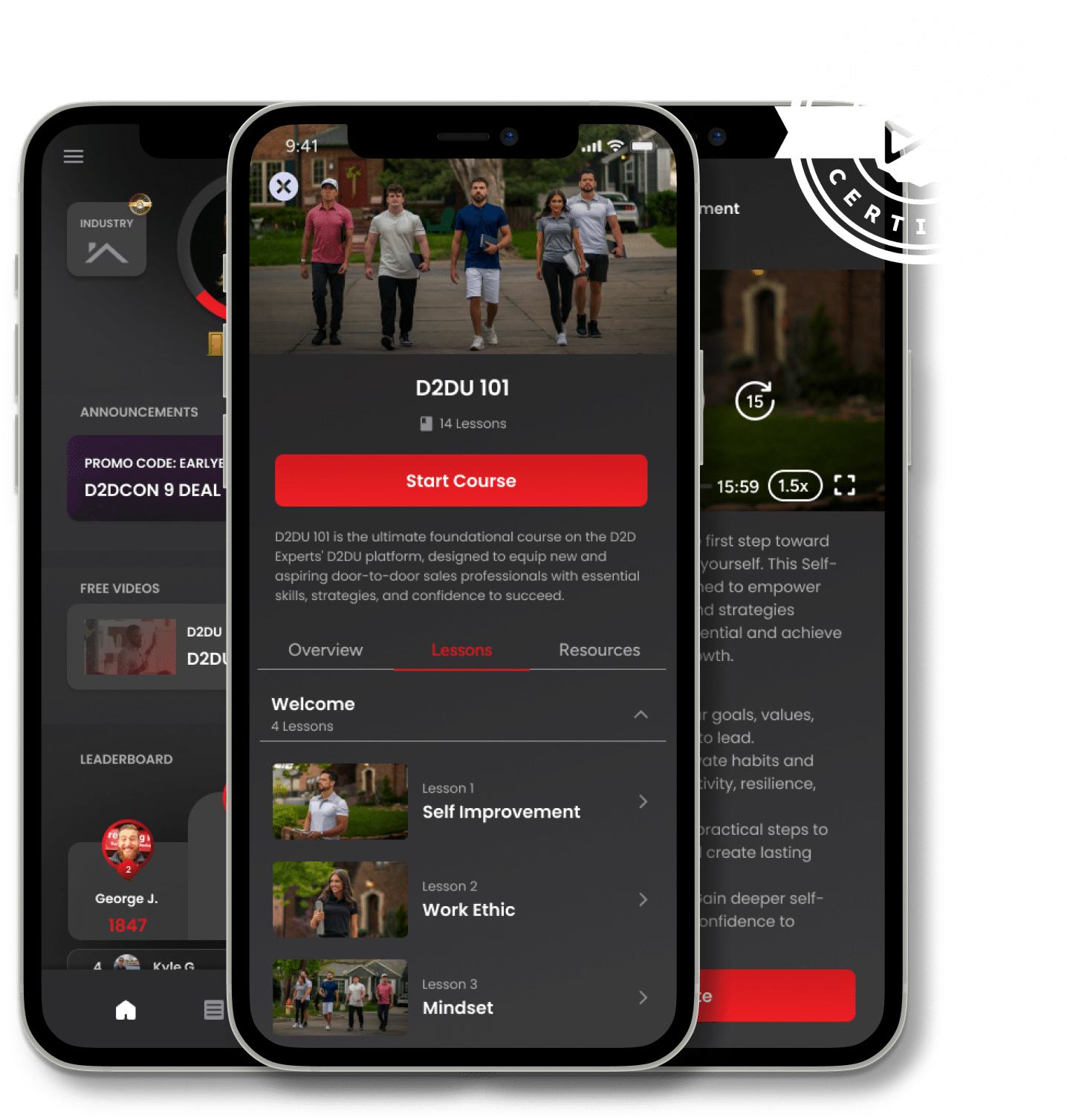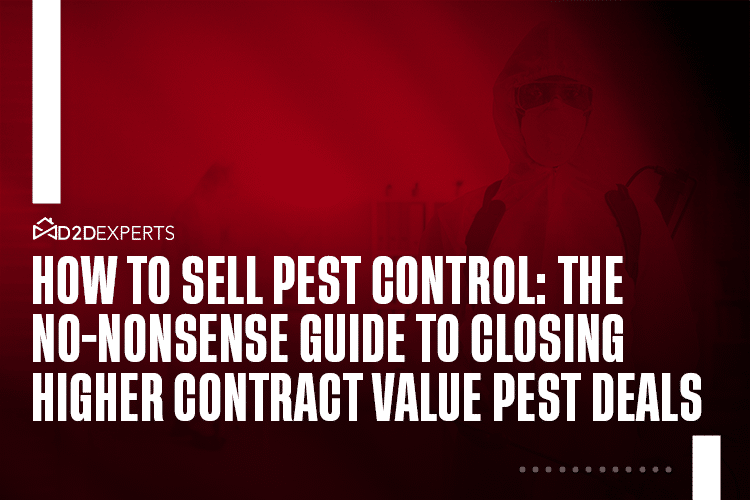The U.S. professional pest control market was valued at $24.9 billion in 2023 and is projected to reach $42.5 billion by 2032. That’s a massive number of homes needing pest control and an even bigger number of potential customers looking for the right service. The real question? Are you maximizing your contract value and earning the best commissions possible?
Summary:
This blog offers insights on succeeding in the $25 billion U.S. pest control industry by understanding customer needs and offering value-driven services, like eco-friendly options and flexible pricing. It emphasizes building trust through professionalism, expertise, and customer reviews. Sales strategies such as door-to-door outreach and digital marketing are highlighted, with the ultimate goal of positioning yourself as a problem solver and building long-term relationships.
The U.S. professional pest control market was valued at $24.9 billion in 2023 and is projected to reach $42.5 billion by 2032. That’s a massive number of homes needing pest control and an even bigger number of potential customers looking for the right service. The real question? Are you maximizing your contract value and earning the best commissions possible?
KEY POINTS
- Master your market by precisely identifying and segmenting prospects
- Command premium contracts with compelling, tiered offers and standout USPs
- Cement trust and close more deals with a polished expert brand
Homeowners don’t want to wake up to a roach in their cereal or a mouse that has made itself comfortable in their pantry. The demand for pest control services is strong, making it one of the most profitable door-to-door sales industries.
Sales reps often fall into the trap of underselling their service, believing customers won’t pay more. However, top-performing reps consistently sell at higher contract values because they build more value, trust, and urgency in their pitch.
I break it down in a video here.
“Reps that charge $400 per contract think they’ll sell more, but those closing $800–$1,200 contracts actually sell the most. Why? Because they believe in their service, hold their value, and don’t race to the bottom.”
If you’re knocking doors selling pest control or just getting started and need to know everything about how to sell pest control, this guide will walk you through how to sell pest control so that you’re closing bigger deals by positioning yourself as the expert, crafting a compelling offer, and using effective sales techniques to drive higher contract values.

Understanding Your Market: Who Are You Really Selling To?
Identify Your Target Audience
Not all customers are the same. Some are desperate to get rid of their problems, while others just want preventative services but don’t know they need them yet. Knowing the difference is key.
- Homeowners – These are your bread and butter. They care about their families, kids, and pets. If they see a cockroach, they’ll pay to never see one again.
- Renters are trickier. Some landlords take care of pest control, and others don’t. The best approach is to sell them on keeping their home pest-free and then upsell their landlord on a long-term service plan.
- Landlords and Property Managers – They’re not thinking about pests but about keeping tenants happy. If you can make pest control one less thing they must worry about, you’ll land recurring contracts.
- Businesses—restaurants, warehouses, hotels—are nightmares for pests. A single bad Yelp review mentioning a cockroach can cost them thousands. These customers will pay top dollar for guaranteed prevention.
Research Local Pest Issues
Nobody cares about cockroach control if their real problem is termites. Know what pests are common in your area.
🔍 Use Google Trends, local news, and online forums to see what pest problems people are talking about.
💬 Join local Facebook groups where homeowners complain about pest issues—you’ll see exactly what your future customers deal with.
📍 Adjust your pitch based on the season. Mosquitoes in the summer? Mice in the winter? Your offer should match the problem.
According to Bailey Stanley, a $650K pest control closer, location makes a difference, but your mindset and pitch matter more. He dominated New Jersey by adapting his pitch and moving fast, proving that top performers don’t rely on “good areas”—they create them. (Golden Door Winner Interview)
Crafting a Compelling Offer: Give Customers a Reason to Say Yes
Highlight Unique Selling Points (USPs)
You’re not just another pest control company—you’re the best option they’ll ever get. Tell them why.
✅ No-Contract Options – Many homeowners hate contracts. You’ll win more deals if you can offer a no-commitment trial that turns into a long-term relationship.
✅ Kid and Pet-Friendly Treatments – This is huge for families. Make it clear that your products are safe while still being effective.
✅ Fast Service Guarantee – Pests don’t wait. Customers will always choose you over competitors if you can guarantee same-day or next-day service.
Create Tiered Service Packages
Not every homeowner will go for your top-tier package, but you’re leaving money on the table if you don’t offer options.
Example Pest Control Packages:
| Package | Includes | Best For |
| Basic | Quarterly treatments, basic pest prevention | Budget-conscious homeowners who want essential protection |
| Premium | Covers all pests, unlimited service calls, mosquito add-on | Families needing comprehensive and flexible protection |
| Elite | Everything in Premium + termite protection, attic sealing, and rodent exclusion | Homeowners seeking total pest prevention and long-term value |
Why does this work? People like choices. If they can pick between three levels instead of just saying “yes” or “no,” they’re more likely to say yes to something.
Raising Contract Values: Selling at the Price You Deserve
Too many reps default to the lowest contract value their company allows, thinking it’ll help them close more deals. But the top salespeople know that customers are willing to pay more—if you build enough value.
As I discuss here, increasing your contract value comes down to three key factors:
1. Your Environment & Mindset – If everyone around you is selling low, you’ll feel pressured to do the same. Surround yourself with high performers who set the pace for higher contract values.
2. Belief in Your Service—Know your company, product, and process inside out. When you’re convinced that your service is worth more, customers will be, too.
3. Confidence in Pricing – Customers will sense it if you feel bad about charging more. Apple doesn’t feel bad charging $1,200 for an iPhone that costs them $100 to make, because they know the value they offer. You should feel the same way about your pest control service.
The difference between a $400 contract and a $1,000+ contract is not the service—it’s your ability to create perceived value. Customers pay for peace of mind, professionalism, and expert-level solutions.
“The only way you can serve the client at the highest level is to provide great value and transact—no more, no less.” – Sam Taggart
Next time you knock on a door, stop thinking, “How low can I go?” and instead ask, “How much value can I create?” The best salespeople in pest control do not sell on price. They sell on trust, expertise, and problem-solving and make twice the commission because of it.
Close Bigger Pest Control Deals Now!
Your No-Nonsense Guide to Higher Contract Values.

Real-World Scenario: How One Pest Control Rep Tripled His Contract Value
Let’s imagine a sales rep named Ethan, a regional pest control professional who was stuck in a plateau — small contracts, tough competition, and no clear path to growth. But within six months, he tripled his average contract value by changing his strategy, not his service area.
What Changed for Ethan
Instead of chasing quick deals, Ethan started thinking long-term — focusing on understanding customer pain points and tailoring his pitch to match their needs.
- Localized Insight: He noticed a seasonal spike in ant and termite cases each spring. So, he began opening conversations with local insights that immediately built relevance and trust.
- Value-Driven Pitch: Rather than selling pest control as a “routine service,” he framed it as protection for homes and families, positioning it as a smart, preventative investment.
- Tiered Service Options: By offering three clear plans — Basic, Plus, and Premium — customers could easily compare value. Most ended up choosing the mid-tier or premium options, naturally increasing his average sale.
The Results
Over six months, Ethan’s close rate climbed from 28% to 54%, and referrals grew by nearly 40% — all without expanding his territory or cutting prices. His success came from repositioning himself as a trusted advisor, not just a salesperson.
The Takeaway
Ethan’s story proves that the right pitch, mindset, and local understanding can turn modest opportunities into major wins. It’s not about selling harder — it’s about selling smarter, with empathy and value at the core of every conversation.
Building Trust and Credibility: Why Should They Believe You?
Develop a Professional Brand
Nobody trusts a salesperson with a wrinkled shirt and a scratched-up clipboard. Look the part, act the part, be the expert.
- Wear a company-branded shirt. It instantly adds credibility.
- Carry a clean, professional-looking iPad to show packages and pricing.
- Have printed testimonials from happy customers. Social proof sells.
Showcase Expertise
You’re not just selling pest control; you’re educating customers on why they need it. They’ll trust you more if you teach them something they didn’t know.
🚨 Did you know? Termites cause over $5 billion in property damage annually; most insurance doesn’t cover it.
Customers appreciate experts; they’ll buy from you if they trust you.
Leverage Customer Reviews and Testimonials
Before you knock on a door, check if they have a Ring camera. Many homeowners watch from inside before answering. Instead of waiting, hold up your phone and show them genuine customer reviews to build trust before they even open the door.
📢 “Your neighbor just signed up—check out what they had to say!”
AI-powered sales tools like Sellify have revolutionized this approach, using automated follow-ups to maintain customer relationships and upsell additional services effectively. (Thomas Lundberg, CEO of Sellify)
Sales Strategies and Techniques: How to Close More Deals
Cold Calling and Door-to-Door Sales
🚪 The first 10 seconds matter. If you don’t hook them, they’ll slam the door.
🔥 Best Opening Line: “Hey, real quick—I’m helping many of your neighbors with pest issues. You’ve probably seen more [termites/roaches/mosquitoes] around lately, right?”
If they say yes, you’re in.
If they say no, pivot: “That’s great! That means our treatment works in this area—let’s keep it that way.”
Leveraging Digital Marketing
If you’re not leveraging Google My Business (GMB) and SEO, you’re missing out on a steady stream of inbound leads that could make your door-to-door efforts even more effective. While knocking doors remains one of the best ways to generate immediate, high-intent customers, combining it with digital marketing strategies can create a constant lead flow that keeps your pipeline full year-round.
An effective pest control advertising strategy that leverages a well-optimized GMB profile with fresh photos, updated contact information, and positive reviews can significantly improve your local search ranking, leading to more calls and appointment bookings. Facebook and Instagram ads targeting homeowners in your service area can reinforce your door-knocking efforts by warming up the neighborhood before you even show up.
Invest in Ongoing Sales Training
Investing in consistent pest control sales training is one of the most effective ways to boost your team’s performance and close more deals. Regular training helps sales reps stay sharp, handle objections with confidence, adapt to seasonal pest trends, and deliver a more polished pitch. Whether you’re managing a team or selling solo, staying updated on modern sales techniques ensures you stay competitive in a crowded market.
Close Bigger Pest Control Deals Now!
Your No-Nonsense Guide to Higher Contract Values.

Final Words: Dominate Pest Control Sales Today
Selling pest control door to door isn’t about being pushy—it’s about solving a problem before it worsens. Customers buy from salespeople they trust.
✅ Know your market.
✅ Make your offer too good to refuse.
✅ Build trust with credibility and social proof.
✅ Sharpen your pitch and close with confidence.
FAQs
Q1: What’s the best way to approach a potential customer about pest control?
Start with a friendly, non-pushy introduction and ask a question that relates to common pest issues in the area. Example: “Hey, quick question—have you noticed any ants or bugs around the house lately?” This opens the door to a natural conversation rather than a hard pitch.
Q2: How do I differentiate my pest control service from competitors?
Focus on your unique value proposition—whether it’s faster service, eco-friendly products, guaranteed results, or better follow-up care. Customers are often comparing companies, so showing why you’re the better long-term solution is key.
Q3: How can I sell pest control services door-to-door effectively?
Keep it short and engaging. Grab attention with a seasonal hook (e.g., “Ants are swarming now”), identify a problem, present a simple solution, and go for a soft close like: “I’ll be in the area treating a few homes—can I squeeze you in too?”
Q4: What’s the most common reason customers say “no” to pest control—and how should I respond?
The most common objection is cost. Respond by emphasizing the value of prevention versus expensive infestations later. Try: “I get it—no one wants to spend money they don’t have to. But catching issues early saves hundreds in damage later. That’s why we start with a free inspection.”
Q5: How do I handle customers who already have a pest control provider?
Acknowledge their choice, then highlight what makes your service better—like faster response, safer treatments, or flexible pricing. Offer a free inspection to compare value.
Q6: When is the best time to sell pest control services?
Spring and summer are ideal for targeting insect problems, while fall and winter are best for rodent control. Tailor your pitch to the season’s main pest issues.
Q7: How can I use social media to get more pest control leads?
Share real results, customer reviews, and short pest-prevention videos. Use local hashtags and run geo-targeted ads to reach nearby homeowners.
Q8: Why is follow-up important after closing a deal?
Follow-ups strengthen relationships, improve satisfaction, and often lead to referrals or long-term contracts.
Q9: How do I build authority in my local pest control market?
Collect Google reviews, post expert tips, and stay active in community groups or partnerships to increase credibility.
Q10: What key sales metrics should pest control reps track?
Monitor close rate, average contract value, customer retention, and referrals to measure consistent growth.
Q11: How can I turn one-time customers into long-term clients?
Deliver excellent service, maintain regular contact, and offer incentives for quarterly or annual plans.with a free inspection.”
I knocked doors since I was 11! Never bought into the whole hourly normal job, and used direct sales to be the vehicle to create MASSIVE success. I Started the Direct Sales division for Solcius as their VP building it up to have 70+ sales reps nation wide. In 2018 I left to pursue a greater mission to unify and uplevel the Door to Door industry and founded the D2D Experts.


